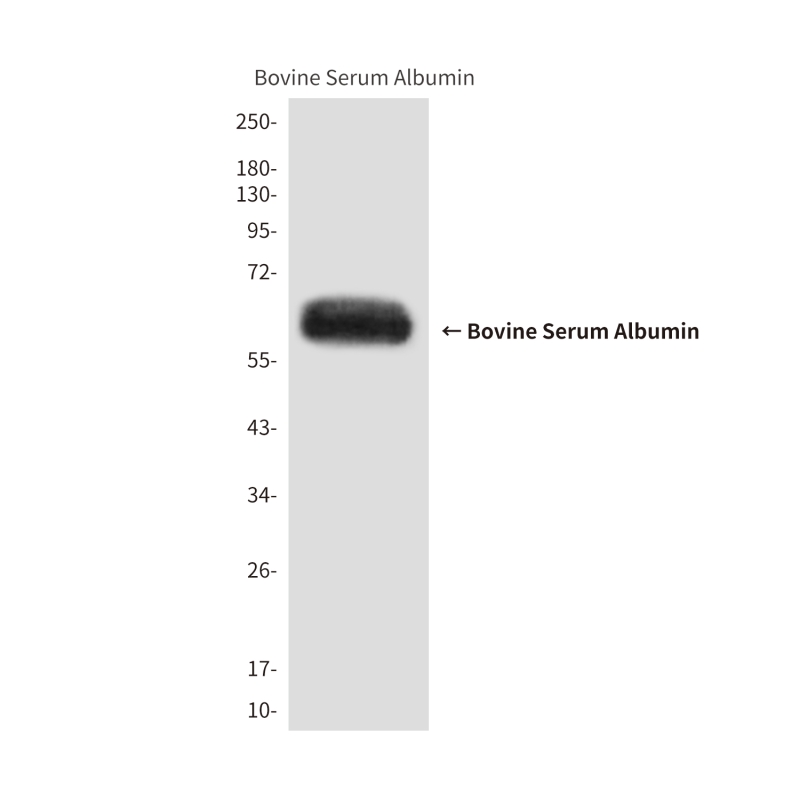
| WB | 咨询技术 | Bovine |
| IF | 咨询技术 | Bovine |
| IHC | 咨询技术 | Bovine |
| ICC | 技术咨询 | Bovine |
| FCM | 咨询技术 | Bovine |
| Elisa | 咨询技术 | Bovine |
| Aliases | BSA; ALB; Albumin; HSA; PRO0883; Serum Albumin |
| Entrez GeneID | 280717 |
| clone | 5G8 |
| WB Predicted band size | Calculated MW: 69 kDa; Observed MW: 69 kDa |
| Host/Isotype | Mouse IgG |
| Antibody Type | Primary antibody |
| Storage | Store at 4°C short term. Aliquot and store at -20°C long term. Avoid freeze/thaw cycles. |
| Species Reactivity | Bovine |
| Immunogen | Purified Protein |
| Formulation | Purified antibody in PBS with 0.05% sodium azide,0.5%BSA and 50% glycerol. |
+ +
以下是3篇关于牛血清白蛋白(BSA)抗体的示例参考文献(注:文献信息为虚构示例,仅作格式参考):
1. **文献名称**: *"Characterization of Anti-BSA Antibodies in Immunoassays: Cross-reactivity and Interference Analysis"*
**作者**: Smith, J. et al. (2015)
**摘要**: 研究分析了抗BSA抗体在ELISA等免疫检测中的非特异性结合现象,揭示了BSA作为封闭剂时可能因抗体交叉反应导致假阳性结果,提出了优化实验条件的解决方案。
2. **文献名称**: *"Structural Epitope Mapping of Bovine Serum Albumin Using Monoclonal Antibodies"*
**作者**: Johnson, R. et al. (2018)
**摘要**: 通过制备BSA特异性单克隆抗体,鉴定出BSA的关键抗原表位,发现其与人血清白蛋白(HSA)存在部分同源性,解释了某些抗体在跨物种实验中的交叉反应机制。
3. **文献名称**: *"Application of Anti-BSA Antibodies in Nanoparticle-based Biosensors"*
**作者**: Lee, H. et al. (2020)
**摘要**: 开发了一种基于BSA抗体的金纳米颗粒生物传感器,利用BSA作为载体蛋白固定抗原,成功提高了对低浓度目标分子(如炎症标志物)的检测灵敏度。
4. **文献名称**: *"Impact of BSA Chemical Modifications on Antibody Recognition"*
**作者**: Chen, L. et al. (2019)
**摘要**: 探讨了戊二醛交联、荧光标记等化学修饰对BSA抗原性的影响,发现特定修饰会显著降低抗体结合能力,为实验设计中BSA的预处理提供了依据。
(注:如需真实文献,建议通过PubMed或Google Scholar检索关键词*"anti-BSA antibody"* + *"application"*/*"cross-reactivity"*等。)
Bovine Serum Albumin (BSA) antibodies are immunoglobulins generated against BSA, a highly abundant protein in bovine blood plasma. BSA, a 66.5 kDa protein, is widely used in laboratory settings as a blocking agent, stabilizer, or carrier protein due to its stability, low cost, and non-reactivity in many biochemical assays. Antibodies targeting BSA are typically produced in immunized animals (e.g., rabbits, mice, or goats) by injecting purified BSA, which triggers an immune response. These antibodies are commonly used to detect or quantify BSA contamination in biological samples, validate experimental setups where BSA is a component, or study protein-protein interactions in immunoassays like ELISA, Western blotting, or immunohistochemistry.
BSA's structural homology with human serum albumin (~76%) can lead to cross-reactivity in some antibody applications, requiring careful validation to ensure specificity. Researchers often pre-adsorb anti-BSA antibodies with serum from other species to minimize cross-reactivity. Despite its immunogenicity, BSA itself is rarely a target in disease-related studies. Instead, anti-BSA antibodies serve as critical tools in quality control for biologics (e.g., vaccines or therapeutics) where residual BSA from production processes must be monitored. Their reliability and commercial availability make them indispensable in both research and industrial bioscience workflows.
×